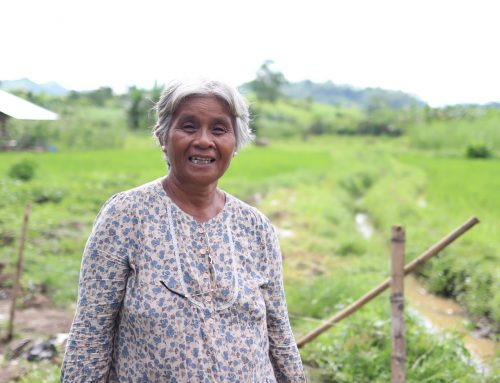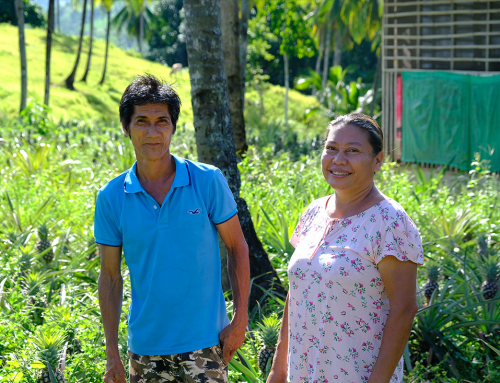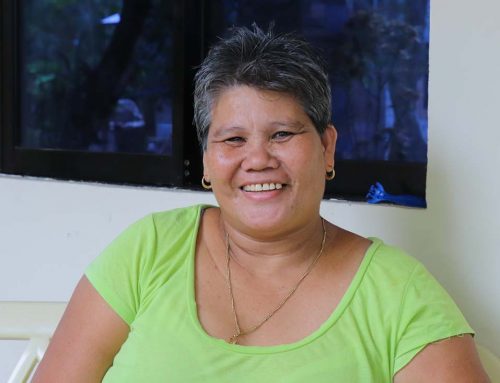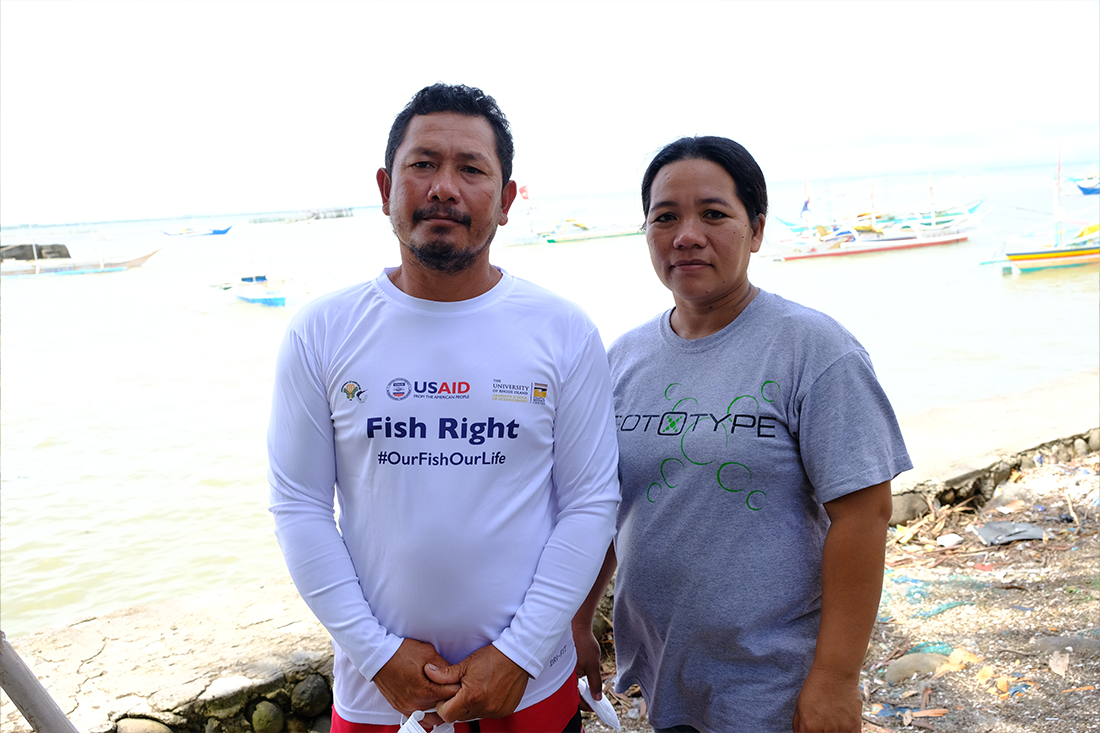
Protecting the Sea That They Call ‘Home’
Richel Alvarado and his wife Mary Ann have spent most of their lives forging against the waves, but they are blessed with the abundance that lies beneath. From the age of seven, Richel has been doing what he now knows by heart: going to the sea to catch fish or crabs.
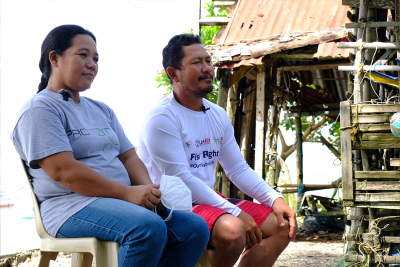
Mary Ann and Richel Alvarado are beneficiaries of a partnership between BFAR-USAID Fish Right Program and Negros Women for Tomorrow Foundation (NWTF) which supports fisherfolk communities in Negros Occidental.
“I practically grew up in the water,” he said.
Richel is a resident of Manapla in Negros Occidental and a member of the Tortosa Pumpboat Association, whose members draw their livelihood from the Visayan Sea. As well as being a fisher and boat owner, he takes part in the Bantay Dagat Task Force. Through the years, he has learned how important it is to fish right.
Taking conservation to heart
“Illegal fishing can destroy coral reefs where fish and crabs live. If we don’t protect our sea from [illegal fishers], then it will be harmed, especially from the use of cyanide, dynamite, and trawls that greatly affect marine life,” he said, adding: “It’s important that we take care of our sea, because our everyday food provisions, as well as our children’s tuition fees, come from there.”
Mary Ann is happy to do her part to keep enough resources in the sea for years to come. Whenever she finds bukakahan or egg-bearing crabs in their catch, she makes sure they are released back to the sea.
“[We do this] to avoid the day when there will be no more crabs to harvest from the sea,” she explained, saying it is important to leave behind adequate resources “for the many generations ahead of us.”
But fishing responsibly is challenging, especially for a parent trying to put food on the table. Richel said it is especially hard during the lean or closed season from November to February when he would have to dive for shells to make ends meet.
Despite the difficulties, Richel and Mary Ann both understand that it is important to protect the sea so it can restore itself. Protecting the sea is a concern for all people because the sea is not just for fishers, but for everyone, Mary Ann said. She feels thankful that there are groups like the USAID Fish Right Program and the Negros Women for Tomorrow Foundation (NWTF) supporting their cause.
Getting help from others
Fish Right is a partnership between the Philippines and the United States that aims to build people’s capacity to practice stewardship of the ocean. In Manapla, Fish Right works with the NWTF, which shares in its mission to build healthy and sustainable fisheries for future generations in the communities they serve.
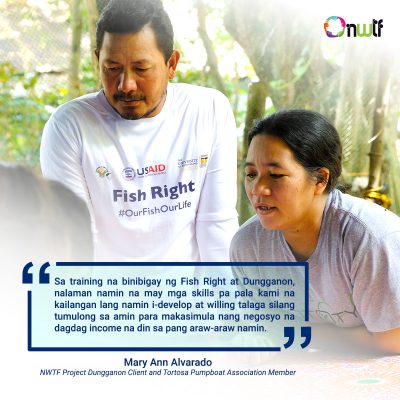
“The training that we are receiving from Fish Right and [NWTF’s Project] Dungganon has been very helpful,” Mary Ann said. “[Through the training,] we learned that we possess skills that we just need to develop. [It has helped] us improve [our skills], which in turn will help us generate more income for our daily needs.”
In response, the Tortosa Pumpboat Association supports marine conservation efforts through mangrove planting and coastal clean-up drives, and by participating in Fish Right’s vessel tracking device project.
Richel was among those who volunteered in the piloting of the vessel tracking device, which involves the use of a CyberTracker-based smartphone app to help fishers and managers map out areas where gravid and undersized blue swimming crabs are commonly found in order to protect and avoid catching them. He explained how fishers like him benefit from using the device: “The tracker has helped us document where we can harvest crabs. In times of emergency, it can also pinpoint our location because of its GPS capabilities. And sometimes, our children use the gadget for their online classes.”
Both Richel and Mary Ann believe that taking part in the project enables them to fulfill their role in protecting the place they consider home: the Visayan Sea.
Making conscious choices for the future
The couple’s appreciation of the importance of conservation stems from knowing firsthand the value of saving for the future.
For many years, Mary Ann and Richel worked as helpers for fishing operators, earning barely enough to get by. Then 17 years ago, Mary Ann joined Project Dungganon, which provides financial services for the poor to create opportunities for self-employment and self-development. Through a loan from the project, she and Richel were able to acquire their own fishing boat and gear with which to start their own business.
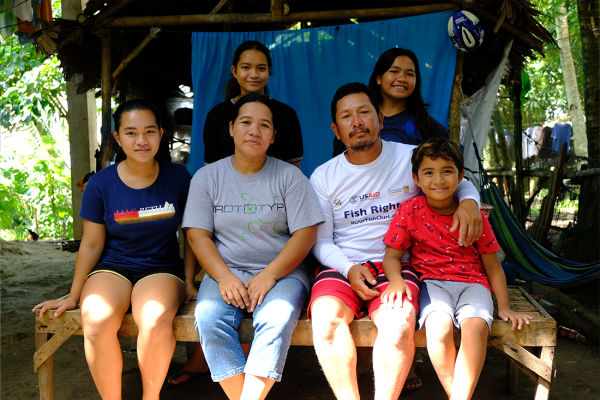
Richel and Mary Ann Alvarado with their four children.
“We learned how to properly manage our expenses, to prioritize more important things over those things that we don’t need yet. And of course, [we learned] how to run a business,” Mary Ann said.
When the pandemic shut down classes last year, their three daughters took turns helping with fishing and related activities, enabling the family to save enough for less regular expenses.
Mary Ann shared, “since there were no classes [during the height of the pandemic restrictions], our children helped their father out in the sea.”
“My daughters were my partners in harvesting crabs,” Richel said. From time to time, Mary Ann takes on the role of helper, too. This has become a way for her and her husband to bond and strengthen their relationship while also earning more income as they are relieved of the need to pay other people to do the job. With the money they have saved, they have been able to renovate their house and provide for their eldest daughter’s education.
“My eldest daughter is now in her fourth year in college, graduating this year, because of the [blessings from the] sea,” Mary Ann happily shared.
Thankful for (and counting on) friends
Mary Ann has nothing but thanks for the help they are getting.
“Because of [NWTF], we were able to put up our own business, as well as have access to medical missions and other services. This is why we keep our [credit] record clean,” she said.
And they are grateful to Fish Right “for the training they provide,” she added, declaring: “We hope that what we have learned, we can use in our daily life.”
In this way, they would contribute more effectively to ensuring that the Visayan Sea remains a viable resource not only for their own family but for all the families and communities who rely on it.

